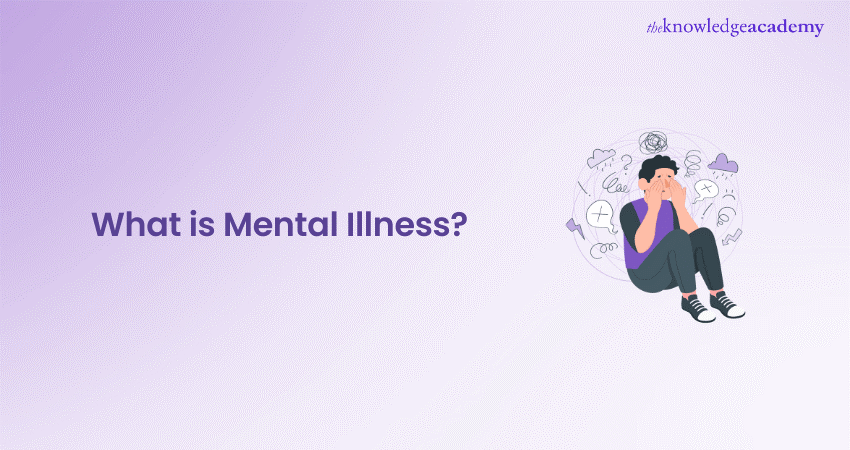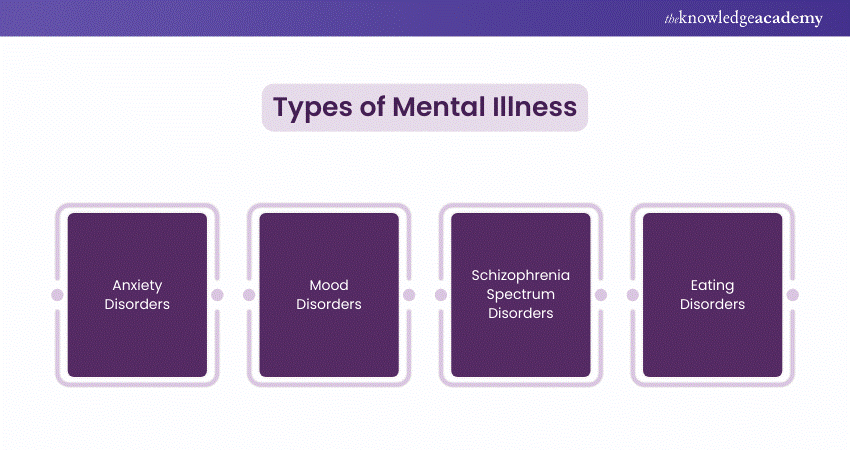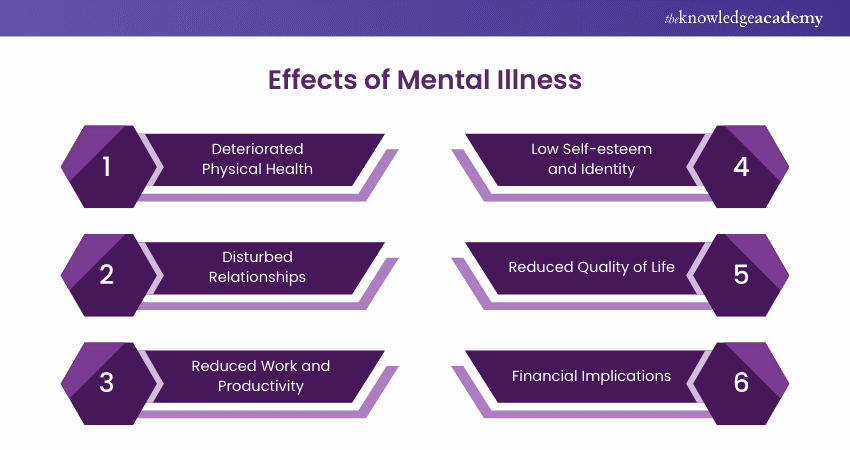We may not have the course you’re looking for. If you enquire or give us a call on +918037244591 and speak to our training experts, we may still be able to help with your training requirements.
Training Outcomes Within Your Budget!
We ensure quality, budget-alignment, and timely delivery by our expert instructors.

Did you know that Mental Health issues affect millions globally, impacting emotional, physical, and cognitive well-being? According to a Lancet report, depression cases surged from 193 million to 246 million post-pandemic, a 28% increase. Understanding mental health is essential to breaking down stigma and promoting well-being. Ready to learn more? This blog sheds light on the question “What is Mental Illness”, its types, symptoms, and societal impact. Let’s uncover fascinating insights into mental health and make a difference together!
Table of Contents
1) Understanding What is Mental Illness?
2) Types of Mental Illness
3) Signs and Symptoms of Mental Illness
4) Effects of Mental Illness
5) Diagnosis of Mental Illness
6) Treatment for Mental Illness
7) Conclusion
Understanding What is Mental Illness?
Before we delve into its types, symptoms, and effects, we will first define What is Mental Illness. Mental Illness can be described as a wide range of conditions that affect emotional, cognitive, as well as behavioural well-being. It involves disruptions in thoughts, emotions, and actions, often caused by distress and impairing daily life. Some of its common examples include Anxiety, Depression, and Schizophrenia.
These illnesses can impact relationships, work, and physical health, signifying the intricate mind-body connection. Therefore, awareness and understanding of Mental Illnesses are crucial for promoting early intervention, reducing stigma, and fostering a society that supports mental well-being through empathy, education, and genuine treatment.

Types of Mental Illness
Mental Illness includes several conditions that affect the way how individuals think, feel, and behave. Here, we will explore some of the most common Mental Health disorders, shedding light on their characteristics, symptoms, and potential impacts:

Anxiety Disorders
Anxiety disorders are marked by excessive worry, fear, and unease that can interfere with regular activities. These disorders include:
1) Generalised Anxiety Disorder (GAD): Persistent and excessive worry about various aspects of life, often without a specific cause.
2) Panic Disorder: Sudden and intense bouts of fear that are accompanied by physical symptoms like rapid heart rate and shortness of breath.
3) Social Anxiety Disorder: Social Anxiety is defined as an overwhelming fear of social situations and a constant worry about being judged by others.
Start your journey as an Anxiety Consultant with our Anxiety Courses- sign up now!
Mood Disorders
Mood disorders primarily involve disturbances in emotional states. There are two common mood disorders as described below:
1) Depression (Major Depressive Disorder): Persistent feelings of sadness and hopelessness, as well as a loss of interest or pleasure in activities that were once enjoyed.
2) Bipolar Disorder: Characterised by alternating periods of depression and mania, which involves elevated mood, high energy levels, and impulsive behaviour.
Schizophrenia Spectrum Disorders
These Mental health disorders cause disruptions in thinking, emotions, and perceptions. Schizophrenia is the most well-known condition in this category, which is characterised by symptoms such as hallucinations, delusions, and disorganised thinking.
Eating Disorders
Eating disorders are associated with distorted attitudes towards food, body image, and weight control. Some of their common eating disorders include:
1) Anorexia Nervosa: Intense fear of weight gain, leading to severe restriction of food intake and often extreme thinness.
2) Bulimia Nervosa Periods: Episodes of binge eating, which is followed by compensatory behaviour such as purging.
3) Binge Eating Disorder: Regular episodes of consuming large amounts of food in a short period, which is followed by feelings of guilt and shame.
Signs and symptoms of Mental Health Illness
Now that you know the definition of Mental Illness and its types, you will now explore its signs and symptoms. Mental Illnesses are complex conditions that can manifest in a variety of ways, affecting thoughts, emotions, behaviours, and even physical well-being. Here are the five key signs and symptoms associated with Mental Health issues:
Emotional Symptoms
The following are some of the emotional symptoms of Mental Illnesses:
1) Persistent Sadness or Hopelessness: Feeling down, sad, or hopeless for an extended period, often accompanied by tearfulness.
2) Excessive Anxiety: Feeling constantly on edge, experiencing intense worry, and having difficulty controlling anxious thoughts.
3) Mood Swings: Rapid shifts in emotions, from euphoria to deep sadness or irritability.
4) Lack of Interest or Pleasure: Losing interest in activities that were once enjoyable and struggling to find pleasure in life.
5) Irritability: An increased tendency to become easily annoyed, agitated, or frustrated.
Cognitive Symptoms
The following are some of the cognitive symptoms of Mental Health disorders:
1) Difficulty Concentrating: Struggling to focus, make decisions, or retain information.
2) Intrusive Thoughts: Distressing or unwanted thoughts that can be difficult to control.
3) Disorganised Thinking: Trouble connecting thoughts logically, leading to disjointed speech or writing.
4) Negative Self-talk: Engaging in self-critical or self-deprecating thoughts on a regular basis.
5) Memory Problems: Experiencing difficulties with short-term memory or recalling important details.
Launch your career in Workplace Safety with our Handle Violence And Aggression At Workplace Course- sign up today!
Behavioural Symptoms
The following are some of the behavioural symptoms of Mental Illnesses:
1) Social withdrawal: Pulling away from social interactions, isolating oneself from friends, family, and activities.
2) Changes in Appetite and Sleep: Significant changes in eating habits and sleep patterns, such as insomnia or oversleeping.
3) Agitation or Restlessness: Being unable to sit still, displaying signs of restlessness or nervous energy.
4) Substance Abuse: Turning to alcohol, drugs, or other substances to cope with emotions or stress.
5) Avoidance of Responsibilities: Neglecting responsibilities at work, school, or home due to lack of motivation or energy.
Physical symptoms
The following are some of the physical symptoms of Mental Illnesses:
1) Fatigue: Feeling constantly tired, even after getting enough sleep.
2) Unexplained Aches and Pains: Physical discomfort with no clear medical cause.
3) Changes in Appetite: Drastic weight loss or gain due to changes in eating habits.
4) Physical Agitation: Restlessness, pacing, or fidgeting.
5) Insomnia or Hypersomnia: Trouble sleeping or excessive sleepiness.
Become a professional therapist with our Psychology Course – join today!
Effects of Mental Health Illness
Mental Illnesses can have profound impacts that touch upon various aspects of an individual's life. Let's delve deeper into each of these pointers:

Deteriorated Physical Health
Mental Health and physical health are interconnected. Mental Health Disorders manifest in physical symptoms like headaches, muscle tension, and gastrointestinal problems. The prolonged stress is associated with mental disorders; it can incapacitate the immune system, making people more prone to illnesses.
Moreover, these conditions can worsen or contribute to chronic physical health conditions such as heart disease, diabetes, and autoimmune disorders.
Disturbed Relationships
Mental Health disorders can strain relationships in various ways. Changes in behaviour, mood swings, and social withdrawal might lead to misunderstandings or strained interactions with family, friends, and romantic partners.
Isolation is a common consequence as individuals may struggle to engage in social activities and maintain connections. Communication challenges stemming from cognitive symptoms can also hinder effective expression and understanding in relationships.
Reduced Work and Productivity
Work and academic performance can be significantly affected by Mental Health issues. Individuals may experience decreased productivity due to difficulties in concentration and lack of motivation.
Impaired decision-making skills can hinder problem-solving abilities. Moreover, stigma related to Mental Health in the workplace may deter individuals from seeking help or disclosing their condition. This can further impact their professional experience.
Low Self-esteem and Identity
Mental Health conditions can lead to negative self-perception and self-doubt. An individual's sense of identity might be compromised as their thoughts and behaviours are influenced by the illness. Feelings of guilt and shame can surface due to internalised stigma or perceived societal judgment, further undermining self-esteem and self-worth.
Reduced Quality of Life
Untreated Mental Health disorders can diminish overall life satisfaction and one's ability to enjoy everyday activities. Opportunities for personal and professional growth may be limited due to the barriers posed by Mental Illnesses. This can extend to the pursuit of goals and aspirations, which can be hampered by the symptoms and limitations of Mental Health conditions.
Financial Implications
There can be financial implications related to Mental Illnesses. Seeking treatment, including therapy and medication, can incur costs. Lost income is a potential outcome of decreased work productivity or time off work due to symptoms. Over time, any untreated Mental Health Illnesses may lead to long-term financial challenges due to difficulties in maintaining stable employment and meeting financial responsibilities.
Diagnosis for Mental Illness
It is essential to get a Mental Health diagnosis from a healthcare provider who has a specialisation in Mental Health to ensure proper treatment, it is crucial to have an accurate diagnosis. A healthcare provider will analyse your symptoms carefully to check your Mental Health. It is crucial to communicate your feelings to your healthcare provider.
1) If there is a specific thing that triggers your mental health and makes it worse
2) If your Mental Health Illness is persistent or ongoing
3) When you first noticed that your Mental Health is not good or there are some changes in your Mental Health
These are not something like medical tests that can help in diagnosing your Mental Health Illness. But your healthcare provider may conduct some tests, like imaging exams or blood work, to figure out other causes that can affect your Mental Health.
Treatment for Mental Illness
Here’s how you can address and manage these conditions effectively. The following are some Mental Illness treatments:
a) Medication: Certain Mental Illnesses can be effectively treated with medication such as antipsychotics and antidepressants. These medications work by altering the chemicals in your brain to alleviate symptoms. It is crucial to follow your healthcare provider's instructions precisely when taking the medication. Additionally, never discontinue medication for mental health illnesses without first consulting with your healthcare provider.
b) Psychotherapy: Having a healthy conversation with Mental Health specialists can help you work through the challenges and deal with the symptoms of Mental Illness. Psychotherapy is a one-to-one session with a healthcare professional or a group setting. Cognitive Behavioural Therapy (CBT) is one of the examples of psychotherapy. It mainly helps you in changing your thought patterns and negative behaviour.
c) Alternative therapies: There are some Mental Health issues like depression that may be treated with alternative therapies. These include examples like herbal remedies, yoga, acupuncture, massage and meditation. But before taking any supplement or herbal remedies, you must consult with your health provider as they may affect other medications.
d) Brain stimulation therapies: Not all Mental Health issues can treat with medications. There are some issues which need brain stimulation therapies. These therapies change the way nerves and other cells in your brain respond to stimuli. Transcranial Magnetic Stimulation (TMS) and Electroconvulsive Therapy are examples of brain stimulation therapies.
Conclusion
We hope you can now answer all the queries about What is Mental Illness. It is an intricate challenge that affects several individuals holistically. Their effects ripple through emotions, relationships, work, and physical health. To combat this issue, we can collectively work towards a more compassionate society by acknowledging these impacts, raising awareness, and offering support. Maintaining mental well-being is paramount for those facing these challenges in our progressive society.
Start Your progressive journey as a Wellness Coach with our Mental Health Courses!
Frequently Asked Questions

A person with Mental Illness may exhibit abnormal behaviours and unusual thinking. They may experience sudden changes in sleep patterns and appetite, withdraw from society, and lose interest in previously enjoyed activities.

When interacting with a person with a Mental Illness, it's important to be patient and listen without judgment. Show empathy, avoid confrontation, and offer support. Encourage them to seek professional help and participate in their treatment. Additionally, maintain clear communication and set boundaries to protect your own well-being.

The Knowledge Academy takes global learning to new heights, offering over 30,000 online courses across 490+ locations in 220 countries. This expansive reach ensures accessibility and convenience for learners worldwide.
Alongside our diverse Online Course Catalogue, encompassing 17 major categories, we go the extra mile by providing a plethora of free educational Online Resources like News updates, Blogs, videos, webinars, and interview questions. Tailoring learning experiences further, professionals can maximise value with customisable Course Bundles of TKA.

The Knowledge Academy’s Knowledge Pass, a prepaid voucher, adds another layer of flexibility, allowing course bookings over a 12-month period. Join us on a journey where education knows no bounds.

The Knowledge Academy offers various Mental Health Courses, including Mental Health and Wellbeing Training, Anxiety Courses, and Social Psychology Training. These courses cater to different skill levels, providing comprehensive insights into Everything You Need to Know About Cognitive Psychology.
Our Health & Safety Blogs cover a range of topics related to Mental Health Management offering valuable resources, best practices, and industry insights. Whether you are a beginner or looking to advance your Mental Health management skills, The Knowledge Academy's diverse courses and informative blogs have got you covered.
Upcoming Health & Safety Resources Batches & Dates
Date
 Positive Psychology Course
Positive Psychology Course
Fri 14th Feb 2025
Fri 11th Apr 2025
Fri 13th Jun 2025
Fri 15th Aug 2025
Fri 10th Oct 2025
Fri 12th Dec 2025







 Top Rated Course
Top Rated Course


 If you wish to make any changes to your course, please
If you wish to make any changes to your course, please


